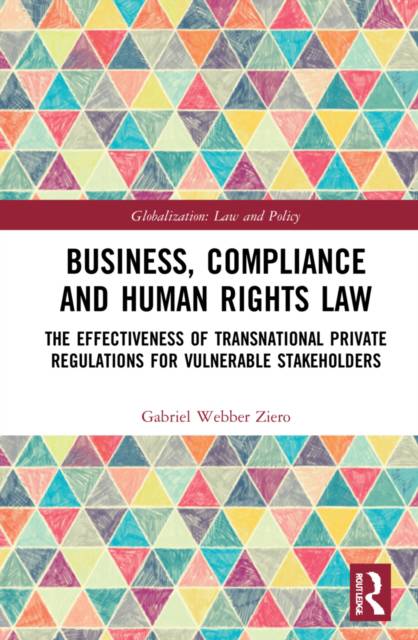
- Retrait gratuit dans votre magasin Club
- 7.000.000 titres dans notre catalogue
- Payer en toute sécurité
- Toujours un magasin près de chez vous
- Retrait gratuit dans votre magasin Club
- 7.000.0000 titres dans notre catalogue
- Payer en toute sécurité
- Toujours un magasin près de chez vous
Business, Compliance and Human Rights Law
The Effectiveness of Transnational Private Regulations for Vulnerable Stakeholders
Gabriel Webber ZieroDescription
In recent years, transnational private regulations (TPRs) have gained importance in the areas of business and human rights, particularly from a consumer point of view. However, some question whether TPRs are indeed suitable normative frameworks contributing to their signatory entities' compliance with human rights standards and effective avoidance of human rights abuses. In response to this question, this book proposes an analytical concept of effective compliance. Based on the elements identified as crucial for achieving effective compliance, it conducts an in-depth analysis of how TPRs' normative frameworks function in practice and identifies common patterns and challenges. Such inquiry is based on an interdisciplinary methodological approach between law and sociology, seeking not only to comprehend and assess how law is systematized in theoretical terms, but also to understand how it works on the ground. This allows identification of the lack of active and effective participation of vulnerable stakeholders in the discursive processes established and governed by TPRs, such as rule-making and conformity assessment processes, as the main challenge. Based on such evidence, the book addresses the possibilities of overcoming such challenges, proposing that to fully achieve TPRs' potential from an effective compliance point of view, legal empowerment of vulnerable groups is essential. It concludes by providing key observations and suggestions that contribute to the use of TPRs as instruments in the struggle for rights of empowered vulnerable stakeholders.
The book will be of interest to academics, researchers, and policy-makers working in the areas of international law, transnational law, sociology of law, and human rights law.
Spécifications
Parties prenantes
- Auteur(s) :
- Editeur:
Contenu
- Nombre de pages :
- 214
- Langue:
- Anglais
- Collection :
Caractéristiques
- EAN:
- 9781032026633
- Date de parution :
- 29-12-21
- Format:
- Livre relié
- Format numérique:
- Genaaid
- Dimensions :
- 156 mm x 234 mm
- Poids :
- 526 g

Les avis
Nous publions uniquement les avis qui respectent les conditions requises. Consultez nos conditions pour les avis.






